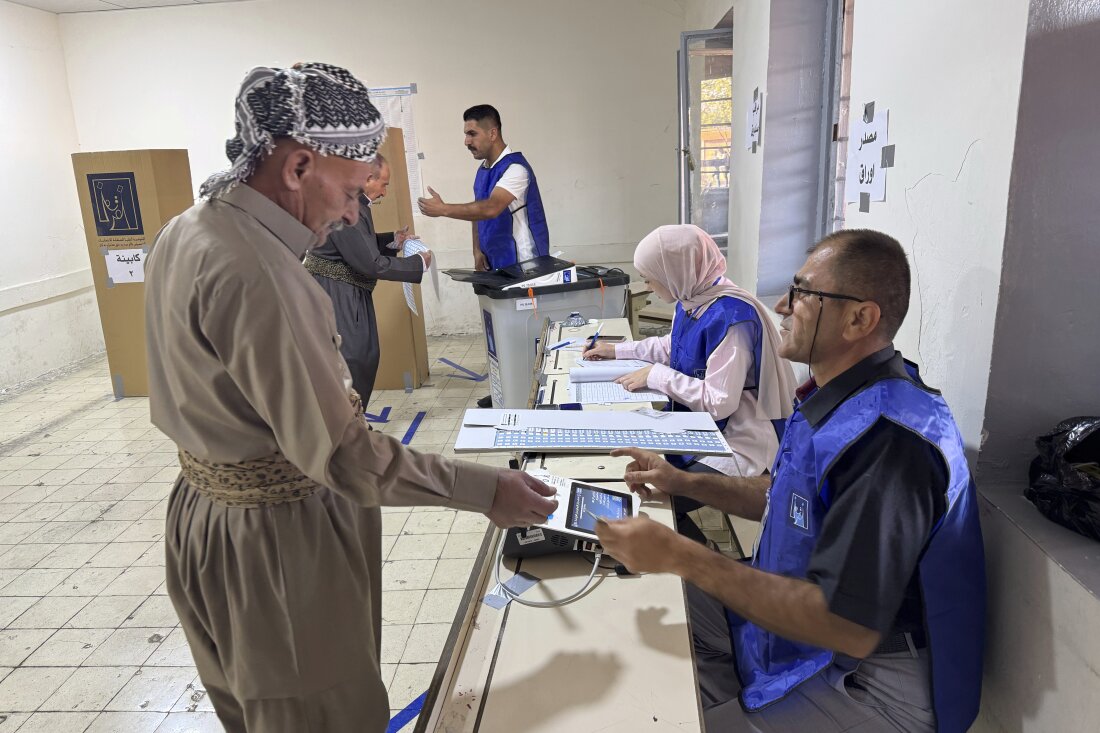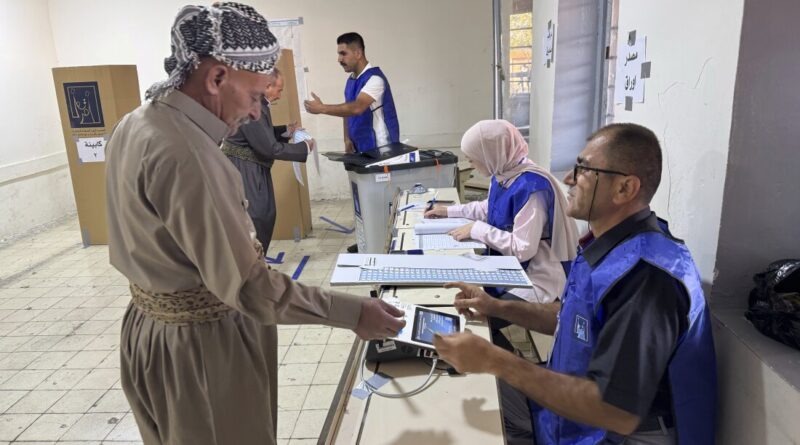Iraq’s Kurds go to the polls with a high economic profile

A man registers to vote during parliamentary elections in Iraq’s autonomous Kurdish region of Irbil on Sunday.
Salar Salim/AP
hide description
toggle caption
Salar Salim/AP
IRBIL, Iraq – Residents of Iraq’s autonomous Kurdish region went to the polls in long-awaited parliamentary elections on Sunday under the shadow of ongoing conflict, economic instability and unrest. resolved with Baghdad.
The main competitors are the two main Kurdish parties: the Kurdistan Democratic Party and the Patriotic Union of Kurdistan. The two have been in control of different parts of the region, with the KDP in charge of the regional capital, Irbil, and Dohuk and the PUK ruling Sulaymaniyah.
This division often creates political tension. Parliamentary elections, originally scheduled for 2022, have been postponed several times amid disputes over the law and electoral process.
Employees of the Ministry of Internal Affairs and peshmerga forces – the local army – voted in special elections on Friday, and general public elections on Sunday.
In Friday’s special election, the KDP took a big lead, winning 60% of the vote, while the PUK got about 30%. The New Generation Movement, an opposition party that has seen a steady rise in support, received 5.3% of the total, up from 3% in the 2018 special election. In that special election, the KDP received 40% of the vote and PUK 28.5%.
Although the appeal of the New Generation continues to grow, especially among young voters who are disillusioned with the traditional political system, it still faces significant challenges to compete with the stable KDP government. and PUK.
The results of Sunday’s election were expected to be announced on Monday.

In some polling stations, there were delays due to the malfunctioning of the fingerprint machines used for the biometric verification of the voters’ identity. In some cases, it was unclear whether voters whose fingerprints could not be scanned would be able to vote at all.
In Irbil’s Ankawa district, resident Raman Ramzi said his wife and mother have not been able to vote because of the fingerprint and ID recognition generated by biometric machines. Several other candidates left the station without voting due to the same issue.
In one polling station in Irbil, coordinator Sirwan Gardi said that three to four percent of the fingerprints of prospective voters are not recognized by the devices, especially the elderly and women.
Rizgar Maghdid, whose fingerprints were not accepted, said he was hurt because he could not vote. Voting “is a fundamental human right,” he said. “I would like to vote for someone who will serve us and our country.”
Regional government prime minister Masrour Barzani, a KDP official, asked voters to “reward service and truth and punish parties that play with the rights and destiny of the people of Kurdistan,” using the region’s name.
The region’s economic woes are a top concern for voters. Despite its oil wealth, the Kurdish region faces significant economic challenges, including delayed payment of salaries to civil servants, fluctuating oil prices, and budget cuts in Baghdad. The public is deeply dissatisfied with the economy and lack of opportunities, and many blame political leaders for poor governance.
“People want to have electricity and to be paid their salary on time, and to have more jobs. This is what they want,” said Ghazi Najib, who went to the polls in Irbil.
Corruption is also a major issue in the election. For years, the county government has faced allegations of discrimination and lack of transparency. Many voters, especially young people, are calling for changes to address these issues.
Many voters, however, have lost hope of change and question the power of the opposition parties to make changes, given the long tenure of the two main parties. that too in terms of political conditions.
Political cooperation with central government is another important electoral issue. Relations between Irbil and Baghdad have been strained since the 2017 referendum on the independence of the Kurdish region, particularly over issues of oil revenue distribution and funding.
The Prime Minister of Iraq, Mohammed al-Sudani, during a recent visit to Irbil, said, “We intend to guarantee the rights of the Kurdish people, but this must be done within the framework of the Iraqi constitution.”
Elsewhere, the current election is heavily influenced by security concerns since sleeper cells of the Islamic State group are active in areas where there are disputes between local and central governments.
“We hope that Kurdistan will be more developed, and to see the security and reconstruction of Kurdistan,” said Jamila Mohammed Amin, a candidate for Irbil. “All political parties and organizations should work together to achieve these goals and defend them against enemies.”
#Iraqs #Kurds #polls #high #economic #profile
